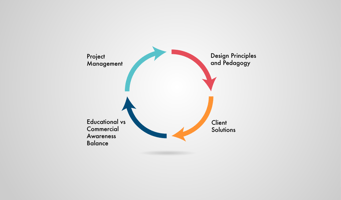In this Oppida Talks vlog, Oppida CEO Bianca Raby takes a practical look at blended learning....
Short courses vs microcredentials: terminology matters!

In this opinion piece, Oppida CEO Bianca Raby explains why it matters to know that short courses vs microcredentials are not the same thing.
Jordan B. Peterson’s 10th rule for life, from his 2018 book 12 Rules for Life: An Antidote to Chaos, is: Be Precise in Your Speech. Peterson philosophises that chaos emerges in a household, bit by bit. This is what happens when we don’t pay attention to the small things. Chaos.
This rule came back to me this week, when I saw—yet again—an article which claims to be speaking about microcredentials (in the title) but is actually talking about short courses (in the content).
Short courses and microcredentials are not the same thing and it matters that the education sector knows why!
Let me explain.
Short course—TYPE 1
When a program is chopped up into pieces, learners enroll in individual courses (some institutions call them subjects). These courses build (stack up) towards being recognised for completing the program. Or, sometimes, each course is recognised as having its own value.
Then, when a course (or subject) is chopped up into pieces, learners are enrolling in modules.
So, when a university is offering you a smaller learning experience that can count towards a larger certification or accreditation you are getting a ‘short course’.
More often than not, these have not been purposefully designed to be done independently. They are just ‘chopped’ out of larger offers. They are mostly used to generate leads for full programs as they have a lower financial and time commitment barrier to entry.

Short course—TYPE 2
A second type of short course is one that is purpose-built to address an industry need or is launched by an entrepreneur.
For example, RMITOnline offers a range of industry-relevant courses as ‘short courses’. These are standalone experiences and they will often issue a badge. They have Learning Outcomes, Learning Objectives and Assessment tasks. They have been built as a linear learner journey to teach specific skills or knowledge.
This is not a microcredential.

What is a microcredential then?
A microcredential is purposefully designed for the learner to be able to demonstrate their competency. Learners use them to verify, validate and attest that specific skills and/or competencies have been achieved.
They are built around evidence submissions… which can be tied to objectives set out by the credential designer. The tasks outlined for the evidence submissions are usually driven by industry and what someone with this ‘credential’ would have to demonstrate practically to be competent. It is based more on competency, rather than knowledge.
A good microcredential offering will also be accompanied by the opportunity for the candidate to undertake other learning journeys to support the evidence submissions and plug any knowledge/skills gaps the learner may have. However, it is not a course per se. It’s more of a series of learning bites that align directly to submission tasks (a.k.a.—competencies that make up the credential).
Oppida is currently building a microcredential in Learning Design. So one of our evidence submissions for budding learning designers is to develop learner personas and use them to inform some design elements of a fictitious (or real) course they are building. This is an actual task all our learning designers must achieve with our customers.

Short courses and microcredentials in summary
A microcredential empowers each individual enrolled on it to demonstrate competency…. not just click through a course, skip to the assessment task and hope it’s relevant to the real world! There should be no requirement to actually do any ‘learning’ controlled by the designer of the credential to get a credential. This part should be optional. If you can demonstrate it, we will give you the elephant stamp. Simple!
The education sector’s confusion of terminology between short courses and microcredentials means that even Australia’s Macquarie Dictionary has mis-defined microcredential as:
a certificate awarded for successfully completing a short course, usually in a specific or work-related skill, either online or by attending lectures, conferences, etc.
Macquarie Dictionary Publishers, 2020. Accessed online.
If we, the education sector, continue to send mixed messages through the way we use terminology in our speech and writing, if we interchange terms and confuse the educational design process, what hope do we have to offer better solutions to the skills crisis we know the global market is facing? Every seasoned educator knows all the ‘problems’ with the system and feels the weight of them. I believe we all have an opportunity to be a small part of the solution by just following Jordan’s advice: be precise in your speech.
Read more about alternatives to higher education and microcredentials in this Oppida blog post.




